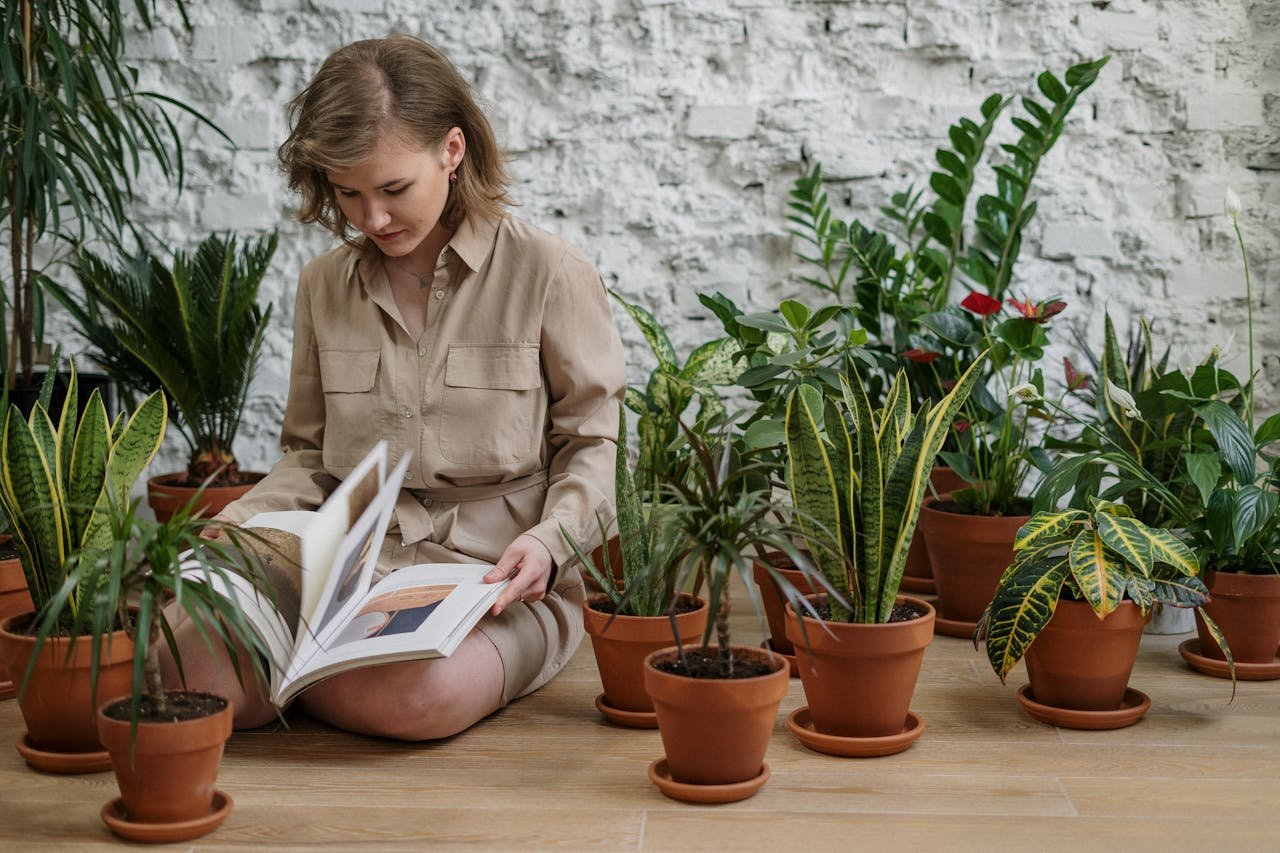Plants for Better Sleep Quality: Once upon a time, in a bustling city where the lights never seemed to dim, Sarah struggled to find restful sleep. Tossing and turning night after night, she felt the weight of sleep deprivation seeping into every aspect of her life. One day, a friend mentioned the idea of using indoor plants to improve sleep quality, and Sarah’s curiosity was piqued.

introduce Plants for Better Sleep Quality
- Plants have been known for their calming and soothing effects on the mind and body.
Certain plants, such as lavender and jasmine, release scents that can promote relaxation and reduce stress levels.
The presence of plants in the bedroom can enhance air quality by removing toxins and releasing oxygen, creating a more conducive environment for sleep.
As Sarah delved into the world of plant benefits for sleep, she discovered that certain plants, like aloe vera and snake plants, can even improve respiratory function and help combat sleep-disrupting factors like allergies and pollutants. The natural beauty of plants also brought a sense of tranquility to her bedroom, transforming it into a peaceful sanctuary where she could unwind and prepare for a restful night’s sleep. - Intrigued by the potential of plants to enhance her sleep quality, Sarah decided to bring a few different varieties into her bedroom. With each new addition, she noticed subtle changes in her sleep patterns – falling asleep faster, waking up more refreshed, and experiencing a deeper, more restorative sleep.
- As Sarah’s journey with indoor plants continued, she marveled at the transformative power of nature in improving her sleep quality. Through the simple act of surrounding herself with greenery, she had unlocked a newfound sense of peace and harmony that resonated through her nights and into her days.
- The Relationship Between Plants and Air Quality in Improving Sleep
Indoor plants play a crucial role in enhancing air quality, which in turn can significantly improve the quality of sleep. The process of photosynthesis, where plants absorb carbon dioxide and release oxygen, helps to purify the air in indoor spaces. This fresh oxygen not only makes the air cleaner but also increases oxygen levels in the environment, promoting better sleep.
More
- Plants such as lavender, jasmine, and aloe vera are known for their calming and soothing properties, which can help to create a relaxing atmosphere in the bedroom. This tranquil environment is conducive to falling asleep faster and enjoying a more restful night’s sleep.
- Many indoor plants act as natural air purifiers by filtering out toxins and pollutants present in the air. This purification process can reduce the likelihood of respiratory issues and allergies, allowing individuals to breathe more easily while they sleep.
- In addition to improving air quality, plants can also help to regulate humidity levels in the bedroom. Maintaining optimal humidity levels can prevent dryness in the air, reducing the risk of irritation in the throat and nasal passages, leading to a more comfortable sleep environment.
- Incorporating a variety of plants into your bedroom decor not only adds a touch of nature but also contributes to creating a peaceful and healthy sleep environment. By taking care of indoor plants and ensuring they receive adequate sunlight and water, you can enjoy the benefits of improved air quality and better sleep.
Plants That Are Known to Improve Sleep Quality
Indoor plants not only add a touch of nature to your living space but can also contribute significantly to improving your quality of sleep. Certain plants are renowned for their ability to purify the air, reduce stress, and promote relaxation, making them ideal additions to your bedroom for a restful night’s sleep.
- Lavender: Known for its soothing aroma, lavender is a natural sleep aid that can help reduce anxiety and improve the quality of sleep. Placing a pot of lavender on your bedside table can promote relaxation and create a calming atmosphere in your bedroom.
- Snake Plant: Also known as mother-in-law’s tongue, the snake plant is an excellent air purifier that releases oxygen at night, improving the air quality in your bedroom while you sleep. This plant is low maintenance and can thrive in low light conditions, making it a perfect choice for indoor spaces.
- Aloe Vera: Beyond its healing properties, aloe vera emits oxygen at night, increasing the air quality in your bedroom. The plant is easy to care for and can add a touch of greenery to your sleeping space while working to purify the air.
- Jasmine: The sweet fragrance of jasmine is not only delightful but also has sleep-inducing properties. Studies have shown that the scent of jasmine can lead to deeper, more restful sleep, making it a beneficial plant to have in your bedroom.
- Peace Lily: With its elegant white blooms, the peace lily is a powerful air purifier that can remove harmful toxins from the air, promoting better breathing while you sleep. This plant thrives in shade and is easy to care for, making it an ideal choice for indoor spaces.
These plants can work wonders in creating a tranquil and relaxing environment in your bedroom that is conducive to a good night’s sleep.
The Role of Aromatherapy in Enhancing Sleep with Plants
Aromatherapy, a practice that utilizes plant extracts to promote health and well-being, can play a significant role in enhancing sleep quality. Essential oils derived from various plants have calming and relaxing properties that can help create a peaceful environment conducive to better sleep. Here are some key ways in which aromatherapy can improve sleep with indoor plants:
- Lavender for Relaxation: Lavender is well-known for its soothing aroma that can help reduce stress and anxiety, promoting relaxation before bedtime. Diffusing lavender essential oil in the bedroom can create a calming atmosphere that aids in falling asleep more easily.
- Chamomile for Sleep Induction: Chamomile is another popular herb used in aromatherapy for its sedative effects. Inhaling chamomile essential oil or sipping chamomile tea before bedtime can signal the body to relax and prepare for sleep, leading to a more restful night.
- Ylang Ylang for Stress Relief: Ylang Ylang oil is derived from the flowers of the Cananga tree and is known for its mood-balancing and stress-relieving properties. Diffusing this exotic floral scent can help alleviate tension and promote a sense of well-being, contributing to a peaceful sleep environment.
- Eucalyptus for Clearing Airways: Eucalyptus essential oil has decongestant and invigorating properties that can help clear the airways and improve breathing, especially beneficial for those with respiratory issues or allergies. By promoting better respiratory function, eucalyptus oil can support uninterrupted sleep through improved air quality.
Harnessing the power of aromatherapy through indoor plants and essential oils is a natural and holistic approach to enhancing sleep quality. By incorporating these plant-based remedies into your bedtime routine, you can create a tranquil sleep environment that promotes relaxation, reduces stress, and improves overall sleep hygiene.
Creating a Relaxing Environment with Plants for Better Sleep
Having trouble falling asleep? Consider bringing a touch of nature indoors to transform your bedroom into a peaceful sanctuary. Plants can do wonders for creating a serene and relaxing atmosphere that promotes better sleep. Here’s how you can use plants to enhance the tranquility of your bedroom:
- Lavender Plant: Known for its soothing aroma, the lavender plant has been used for centuries to promote relaxation and improve sleep quality. Place a pot of lavender on your bedside table to benefit from its calming scent.
- Aloe Vera Plant: Not just beneficial for skincare, the aloe vera plant releases oxygen at night, making it an excellent bedroom companion for improving air quality. Its minimal care requirements also make it a great choice for those new to plant parenting.
- Snake Plant: If you struggle with allergies or respiratory issues that affect your sleep, the snake plant is your ideal ally. This low-maintenance plant is a powerhouse in purifying the air, reducing toxins, and increasing oxygen levels, helping you breathe easier while you rest.
- Peace Lily: Not only does the peace lily add a touch of elegance to your bedroom decor, but it also helps in reducing airborne mold spores, making it a suitable choice for those prone to allergies. Its white blooms can create a calming ambiance, perfect for winding down before bedtime.
Incorporating these plants into your bedroom can significantly contribute to a restful night’s sleep. So, why not bring a piece of nature into your sleeping space and reap the benefits of a greener, more tranquil environment for better sleep quality.
Tips for Incorporating Plants into Your Bedroom for Improved Sleep
- Choose the Right Plants: Opt for plants like lavender, jasmine, aloe vera, or snake plants known for their soothing properties and ability to improve air quality.
Consider Placement: Place plants close to your bed where you can enjoy their benefits without disrupting your sleep.
Mind the Size: Select plants that fit your bedroom size – small plants like peace lilies or spider plants work well in compact spaces.- Maintain Proper Lighting: Ensure your plants receive adequate natural or artificial light without creating a disturbance during the night.
- Water Wisely: Avoid over-watering as excessively moist conditions can lead to mold growth, impacting air quality negatively.
- Prune Regularly: Trim your plants to maintain a healthy environment and prevent them from becoming overgrown.
- Monitor Temperature: Keep your bedroom at an optimal temperature for the plants to thrive and contribute to your sleep environment.
- Add Aesthetic Appeal: Choose plants that complement your bedroom decor and create a serene and relaxing atmosphere.
Incorporating plants into your bedroom can greatly enhance your sleep quality by promoting relaxation and improving air quality. Choose plants known for their sleep-enhancing properties, such as lavender or jasmine, and maintain them properly to ensure they contribute positively to your sleeping environment.
The Science Behind How Plants Can Improve Sleep Quality

Indoor plants not only add a touch of nature to your home decor but can also significantly impact your sleep quality. The presence of plants in your bedroom can create a calm and soothing environment that promotes relaxation and better sleep. But how exactly do plants contribute to improving sleep quality?
- Air Purification: Certain indoor plants have air-purifying qualities that help remove toxins from the air, allowing you to breathe cleaner and fresher air while you sleep. Cleaner air can lead to improved respiratory function and better sleep quality overall.
- Humidity Regulation: Plants naturally release water vapor through a process called transpiration, which can help maintain optimal humidity levels in your bedroom. By keeping the air moist but not too damp, plants can prevent dryness that may cause throat irritation and disrupt your sleep.
- Aromatherapy Benefits: Many plants have calming and soothing scents that can promote relaxation and reduce stress and anxiety, leading to a more restful night’s sleep. Lavender, jasmine, and chamomile are examples of plants known for their sleep-inducing aromas.
- Biophilic Connection: The presence of plants in your bedroom creates a connection to nature, even in an indoor environment. This biophilic connection has been shown to reduce stress, lower heart rate, and promote a sense of well-being, all of which are conducive to better sleep quality.
- Positive Psychological Effects: Caring for plants and watching them grow can have a positive impact on your mental health, reducing symptoms of anxiety and depression that may interfere with your sleep. The act of tending to plants can be meditative and relaxing, promoting a peaceful mindset before bedtime.
By understanding the science behind how plants can improve sleep quality, you can strategically incorporate them into your bedroom decor to create a more sleep-friendly environment.
Benefits of Natural Light and Plants for Circadian Rhythm Regulation
Exposure to natural light during the day helps regulate the body’s internal clock, also known as the circadian rhythm. It signals to the brain that it is daytime, promoting wakefulness and alertness.
Natural light exposure can improve mood, energy levels, and overall well-being by syncing the body’s internal clock with the natural day-night cycle.
Plants inside the home can also contribute to regulating circadian rhythms. Certain plants, like snake plants and peace lilies, release oxygen at night, promoting better air quality and potentially improving sleep quality.
Green plants not only release oxygen but can also help reduce stress and create a calming environment conducive to a restful night’s sleep.
Chlorophyll, the pigment that gives plants their green color, helps in absorbing sunlight during photosynthesis. Studies suggest that being around greenery may positively impact mood and mental health.
The combination of natural light and indoor plants can create a harmonious environment that supports healthy circadian rhythms, leading to improved sleep patterns over time.
This natural approach to circadian rhythm regulation through light exposure and plant presence offers a holistic and aesthetically pleasing way to enhance both mental and physical well-being.
Plant Care Tips to Ensure Optimal Benefits for Sleep
Taking care of indoor plants is essential to ensure they thrive and provide optimal benefits for sleep. Here are some useful tips to help you maintain your indoor green companions:
- Watering: Make sure to water your plants regularly, but be cautious not to overwater them. Check the soil moisture before watering to prevent root rot.
- Light: Different plants have varying light requirements, so place them in suitable spots where they can receive adequate sunlight. Plants like succulents prefer bright light, while others thrive in indirect sunlight.
- Temperature and Humidity: Maintain a consistent temperature and humidity level for your plants, as fluctuations can stress them. Most houseplants prefer temperatures between 65-75°F and moderate humidity.
- Pruning and Cleaning: Trim dead leaves and branches regularly to promote new growth and prevent pests. Also, wipe the leaves with a damp cloth to remove dust and ensure optimal photosynthesis.
- Fertilizing: Feed your plants with a balanced fertilizer during their growing season to provide essential nutrients for healthy development. Follow the instructions on the fertilizer packaging for proper application.
- Repotting: If you notice that your plant has outgrown its current pot, consider repotting it to a slightly larger container with fresh soil. This will give the roots more space to grow and access nutrients.
- Pest Control: Keep an eye out for any pests like spider mites or aphids and treat them promptly to prevent infestations. You can use natural remedies or insecticidal soap for effective pest control.
By following these plant care tips, you can ensure that your indoor plants remain healthy and vibrant, providing you with the optimal benefits for a restful night’s sleep.
Additional Lifestyle Changes to Enhance Sleep Quality Alongside Plants
Understandably, adding plants to your living space can significantly improve the quality of your sleep. However, incorporating a few additional lifestyle changes can further enhance your sleep environment and promote better rest.
- Limit Screen Time: Reduce exposure to screens such as smartphones, tablets, and TVs at least an hour before bedtime. The blue light emitted by these devices can interfere with the production of melatonin, the hormone responsible for regulating sleep.
- Create a Relaxing Bedtime Routine: Establish a relaxing routine before bed, such as reading a book, taking a warm bath, or practicing gentle yoga. This can signal to your body that it is time to wind down and prepare for sleep.
- Maintain a Consistent Sleep Schedule: Try to go to bed and wake up at the same time every day, even on weekends. Consistency helps regulate your internal body clock and can improve the quality of your sleep.
- Keep Your Bedroom Cool, Dark, and Quiet: Create an optimal sleep environment by ensuring that your bedroom is cool, dark, and quiet. Consider using blackout curtains, earplugs, or a white noise machine to block out any disruptions.
- Limit Caffeine and Alcohol Intake: Avoid consuming caffeine and alcohol close to bedtime, as they can disrupt your sleep patterns. Opt for calming herbal teas or warm milk instead to promote relaxation.
- Exercise Regularly: Engaging in regular physical activity can improve the quality of your sleep. Aim for at least 30 minutes of exercise most days of the week, but avoid vigorous exercise close to bedtime.
By combining the benefits of indoor plants with these lifestyle changes, you can create a sleep-friendly environment that supports restful and rejuvenating sleep.




